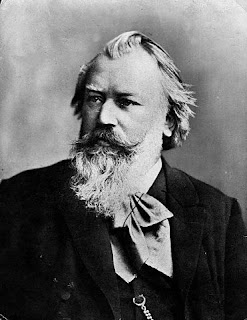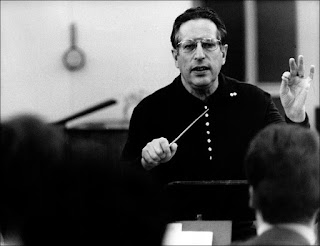Information
Composer: Johannes Brahms
CD1:
Staatskapelle Dresden
Kurt Sanderling, conductor
Date: 1971, 1972
Label: Eurodisc
CD1:
- (01-04) Symphony No. 1 in C minor, Op. 68
- (05) Variations on a Theme by Haydn, Op. 56a
- (01-04) Symphony No. 2 in D major, Op. 73
- (05-06) Symphony No. 3 in F major, Op. 90 (a)
- (01-02) Symphony No. 3 in F major, Op. 90 (b)
- (03-06) Symphony No. 4 in E minor, Op. 98
- (07) Tragic Overture in D minor, Op. 81
Staatskapelle Dresden
Kurt Sanderling, conductor
Date: 1971, 1972
Label: Eurodisc
----------------------------------------------------------------------------
I can still remember my excitement when I first heard these performances when they were issued in the early Seventies – these were vital, gritty, readings of works that in live concerts and recordings often tended to sound bland. So, a nostalgic sigh for these discs which now seem somewhat less riveting, though they are still, at this bargain price, highly competitive. RCA’s repackaging, alas, offers no sensible documentation about the works or their performers. Here we have one of the finest orchestras in the world directed by a man, German by birth, East German by force of circumstance, second for a time to Mravinsky in Leningrad and considered to be amongst the leading conductors of his generation. Rather special! The First Symphony sets the tone of the cycle: seriousness without melodrama, a richly nourished string tone, the whole edifice built on a solid bass line – something akin to Klemperer but, because of wide-vibrato brass (horns especially, of course), more orchestrally individual. The coupling of the Second and Third Symphonies is generous (though without exposition repeats). There is nothing here as opulent or as profoundly moulded as Karajan’s Berlin sound but the lack of showmanship is a plus: for example, the finale coda of the Second is more a grandmaster’s endgame than a jockey’s final straight. The Third, also, is more dignified than glamorous – the opening Allegro is too slow for me, and there’s an especially wobbly horn in the third movement that might prove difficult to live with – but the finale is perfectly measured. The Fourth Symphony is a marvellous display of the Dresden orchestra’s deeply burnished yet powerful sound and of Sanderling’s dedication to structural and dynamic detail. He displays all the fire sometimes missing from his more recent concerts and recordings. No one can equal Furtwängler in the Passacaglia but this performance comes closer than many. The fillers are more than fine. The sheer fun of the ‘Haydn’ Variations is a guaranteed spirit-raiser. The occasional tendency of the CD transfers to deprive the sound of rich treble is not disfiguring and, overall, the set is worth any collector’s limited funds – marginally more recommendable than Günter Wand’s safer, more mainstream readings.
-- David Wilkins, BBC Music Magazine
More reviews:
https://www.amazon.com/Brahms-Symphonies-Haydn-Variations-Tragic-Overture/dp/B000000FL6
-- David Wilkins, BBC Music Magazine
More reviews:
https://www.amazon.com/Brahms-Symphonies-Haydn-Variations-Tragic-Overture/dp/B000000FL6
----------------------------------------------------------------------------
Johannes Brahms (7 May 1833 – 3 April 1897) was a German composer and pianist. In his lifetime, Brahms's popularity and influence were considerable. Brahms composed for symphony orchestra, chamber ensembles, piano, organ, and voice and chorus. Many of his works have become staples of the modern concert repertoire. An uncompromising perfectionist, Brahms destroyed some of his works and left others unpublished. Brahms is often considered both a traditionalist and an innovator. His music is firmly rooted in the structures and compositional techniques of the Classical masters, with a highly romantic nature embedded within.
https://en.wikipedia.org/wiki/Johannes_Brahms
https://en.wikipedia.org/wiki/Johannes_Brahms
***
Kurt Sanderling (19 September 1912 – 17 September 2011) was a German Jewish conductor. He fled the Nazi in 1936, left for Soviet Union. From 1942 to 1960, he was joint principal conductor with Yevgeny Mravinsky of the Leningrad Philharmonic. He was also a close friend of Dmitri Shostakovich. He returned to East Germany where he led the Berlin Symphony Orchestra and Dresden Staatskapelle. He made his British debut in 1970 and later became particularly associated with the Philharmonia Orchestra. Sanderling announced his retirement from conducting in 2002. His three sons are also conductors.
----------------------------------------------------------------------------
FLAC, tracks
Links in comment
Enjoy!



This comment has been removed by the author.
ReplyDeleteplease reupload
ReplyDeleteThis comment has been removed by the author.
ReplyDeleteWould you please renew the links for this post? Thank you!.
ReplyDeleteChoose one link, copy and paste it to your browser's address bar, wait a few seconds (you may need to click 'Continue' first), then click 'Free Access with Ads' / 'Get link'. Complete the steps / captchas if require.
ReplyDeleteIf you are asked to download or install anything, IGNORE, only download from file hosting site (mega.nz).
If MEGA shows 'Bandwidth Limit Exceeded' message, try to create a free account.
https://link-center.net/610926/brahms-symphonies-1
https://link-center.net/610926/brahms-symphonies-2
https://link-hub.net/610926/brahms-symphonies-3
or
https://uii.io/pdzuGjvila
https://uii.io/Byiol0LFAX
https://uii.io/CvKbxQLG
or
https://exe.io/gaZE90Xm
https://exe.io/mZShK
https://exe.io/HCpMxqS